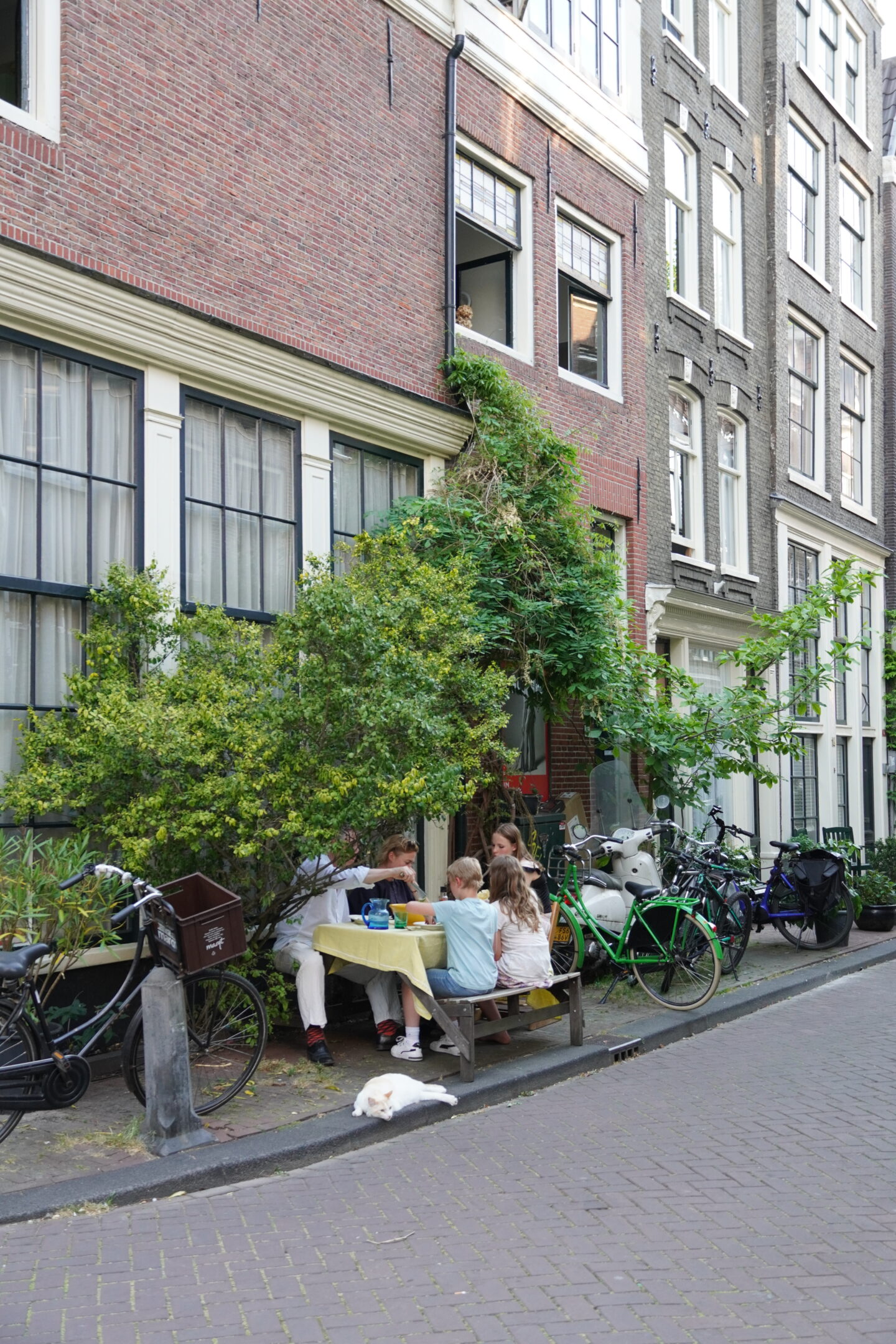Wednesday, January 17, 2024
The more I learn about Dutch culture, the more I fall in love with it. Many of their values align with those of my own. One aspect of Dutch culture that I deeply admire is the emphasis on family values. Dutch society is renowned for being incredibly family-oriented, often cited as one of the best countries for families and raising children. Given its relatively small size, there’s a strong sense of unity within the Dutch community, with a notable emphasis on maintaining robust relationships.

Our neighborhood seems to epitomize this reputation for strong family orientation and community cohesion. Families spend time together, children play on the sidewalks, and grandparents are actively involved with their families. The sense of camaraderie among neighbors is particularly notable. Every Friday in the summer, many adults from our street gather outside on the sidewalk for a communal dinner, their children playing nearby. The gathering typically starts at noon with a glass of wine (goals) and lasts well into the evening. When I picture my perfect future, it looks pretty similar to that.
This wasn’t necessarily my first impression of the Dutch though. Initially, upon moving here, I was told about and even personally encountered the directness and blunt nature of the Dutch. An episode of the podcast ‘Stuff Dutch People Like,’ which is co-hosted by a Canadian woman who has lived in the Netherlands for over 20 years and a native Dutch man, perfectly exemplifies the Dutch trait of being direct. They discuss various aspects of Dutch culture, including this frankness. The woman recounted an experience where she got a rather risky haircut, including bangs, just days before her wedding. When she showed up at work, her Dutch colleagues candidly expressed their dislike for her new haircut. She emphasized that their comments, though blunt, weren’t mean-spirited; they were simply honest. While recounting the story, she laughed, acknowledging that in hindsight, the haircut wasn’t great. However, at the time, such straightforward feedback was shocking to her, especially coming from a North American background where people often refrain from sharing such honest opinions, especially in sensitive situations like that.
This reminds me of a conversation I had with a young Dutch woman while getting my nails done. She was very friendly, asking about my experience as an expat and sharing her aspirations of moving to New York City to work in fashion. During our conversation, she said two things that have stayed with me.
The first being her perception of Americans. She mentioned that sometimes Americans are seen as ‘fake,’ not in a malicious sense, but in the way that no one can be naturally that cheerful and nice all the time. She asked if I thought this characterization was accurate. I had never considered this before, but ultimately, I found myself agreeing with her. I explained that Americans often say what we think we should, despite our true feelings. As an example, I mentioned how we, regardless of our actual opinion, typically opt for having pleasant reactions just to avoid causing offense or discomfort.
The second point she raised was about the difficulty foreign expats sometimes face in establishing friendships with Dutch people. She noted that while Dutch people are very friendly and welcoming, they often don’t follow through on social plans. She asked if our neighbors had been extremely friendly when initially meeting, probably inviting us over for wine and dinner. Indeed, that had been our experience. However, as she guessed, they never followed through with the invitation. She explained that while their offer was sincere, Dutch people tend to get so absorbed in their existing social commitments that they forget these spontaneous plans made in passing. And I can certainly appreciate a busy social calendar.
While there’s certainly truth to the Dutch straightforwardness and rather obvious distaste in wasted time, I’ve come to discover that they are among the warmest and most welcoming people I’ve encountered in my travels. Rarely have I felt uncomfortable during interactions here; rather, most people have been incredibly friendly, greatly easing our transition.
I believe a significant factor in my positive experiences abroad is my mindset. When traveling or living internationally, harboring a perception of being unwanted or unwelcome can color your interpretation of others’ actions. I make a conscious effort to avoid such negative thinking. It’s important to remember that people are generally not as judgmental or focused on you as you might think. Most are too wrapped up in their own lives to spend much time dwelling on others. This perspective has been crucial in shaping my interactions and experiences in a new country.
In my conversations with others about their travel experiences, I’ve noticed a recurring theme: many negative feelings stem from their own fears of judgment. There’s a common misconception that, as Americans, they are automatically judged or unwelcome in foreign countries. However, this is typically far from the truth. Based on what I’ve been told and observed, many foreigners actually have a very positive view of Americans, often describing us as friendly, nice, and polite.
So why do so many of us feel judged when abroad? I, too, have experienced this self-consciousness. Part of the reason, I believe, is that we often judge ourselves and others quite harshly. This leads to a perception that we are inherently worthy of judgment by others. Of course, there are moments, like when Mickey is being obnoxiously loud in public, where I absolutely feel the judgement is warranted. But it’s crucial to remember that being foreigners doesn’t automatically make us unwelcome or subjects of negative scrutiny. More often than not, these feelings stem from our own insecurities rather than the attitudes of those around us.
What then happens is that travelers with this preconceived notion of being unwelcome tend to take even slightly unpleasant or unfamiliar social interactions personally. Many Europeans, for instance, have a communication style that is more blunt and direct than what Americans are typically accustomed to. As a result, American travelers might perceive these interactions as annoyance or hostility, when in fact, this manner of communication is standard and applied universally. It’s important to understand and adapt to these cultural differences in communication rather than interpreting them through our own cultural lens.
This concept of mindset is not just relevant to travel, but to many facets of life. The way we perceive and interpret situations is heavily influenced by our mindset. If we approach circumstances with preconceived assumptions or uninformed opinions, it can drastically shape our experiences and the outcomes. Recognizing the power of mindset is key to understanding how our perceptions can either enhance or hinder our interactions and overall experience of life.
xo, mikaela
